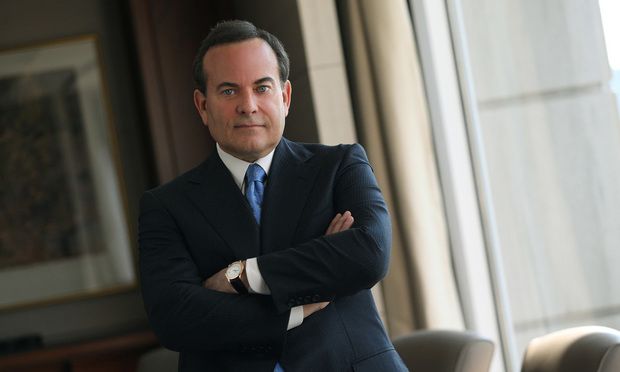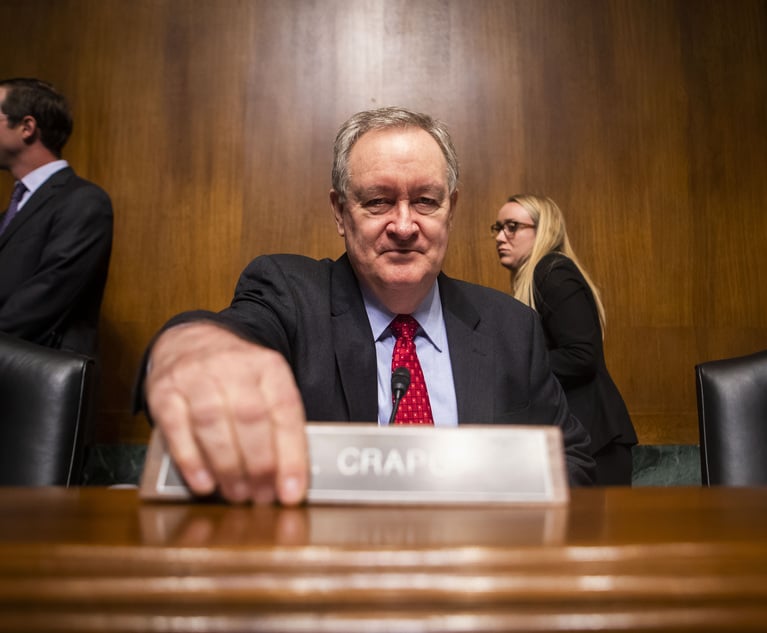Litigator of the Week: Sharing the Limelight--and Reaping the Glory
Representing Canadian technology company WiLAN, McKool Smith founder Mike McKool scored a $145 million jury verdict against Apple.
August 10, 2018 at 12:22 PM
7 minute read
The original version of this story was published on Litigation Daily
 Mike McKool, principal, McKool Smith
Mike McKool, principal, McKool Smith
We're excited to debut a new Q&A format for our Litigator of the Week feature. Our goal is to let the winning litigator tell the story of the case in his or her own voice, and to provide a more personal perspective on the win. Drop me a line and let me know what you think.
It was a tough choice to pick this week's winner. We were impressed by Jordan Goldstein of Selendy & Gay, who led a trial team to victory in Delaware Chancery Court on behalf of hedge fund Mudrick. Invoking Section 220 of Delaware's General Corporation Law, Goldstein succeeded in blocking a proposed merger between Globalstar Inc. and FiberLight, arguing it was unfair to shareholders including his client.
But the crown this week went to McKool Smith founder and chairman Mike McKool. Representing Canadian technology company WiLAN, McKool convinced a federal jury in San Diego that Apple Inc. infringed his client's patents, wrongfully using the covered technology in iPhone 6 and 7 models.
The award? Every penny that he asked for–$145.1 million.
Here's more from McKool on the win.
Jenna Greene: Tell us a little about your client and why they brought this case.
Mike McKool: The patents asserted in this case teach ground-breaking inventions applicable to cellular communications. The lead inventor is WiLAN's Chief Technology Officer, Ken Stanwood. The technology is in use throughout the world and applies particularly in LTE smartphones. My client saw these as “crown jewel” patents that Apple was using, but had refused to license.
Was there an over-arching narrative to your trial presentation?
The narrative we presented was the compelling invention story involving the brilliance of the lead inventor. In the late 1990's, he was a man whose 13 years designing military communication systems made him uniquely situated to propose cutting edge advances in cellular technology.
What were some high points during trial?
The high point for me was the testimony of the lead inventor, Ken Stanwood. Although his brilliance was on display, he also exhibited the humility of his beginnings as a small town kid raised on the Oregon coast from a family of millwrights. My client's chairman, Jim Skippen, was also an open and genuine witness who represented the company well.
What about obstacles?
It's always tough to go against Apple in California. The company has 52 percent of the U.S. smartphone market, and it is viewed positively by most Californians. Jury selection, always critical, was particularly so in this case. Judge [Dana] Sabraw submitted the most in-depth and revealing jury questionnaire I've experienced. That took much of the guesswork out of the selection process.
Any unconventional strategic choices on your part?
I've learned over the years that one of the case killers for a plaintiff is a damages ask that strikes the jurors as excessive. It can damage overall credibility and poison your whole case. While the $145.1 million we asked the jury to award WiLAN is a lot of money, one could have argued for more. I believe that keeping the damages proof extremely reasonable was a credibility boost and a major asset for WiLAN.
You had a formidable opponent in DLA Piper's John Allcock. Do you think litigation is like tennis, where you tend to perform better if you're matched against a strong player?
The kinds of cases we handle always present us with highly skilled opponents, and John was no exception. Going against the best certainly has made me a better courtroom lawyer. I generally walk away from each trial admiring my opponents and appreciating the skill and experience they bring to the courtroom.
After 45 years of doing this, I remain convinced that sincerity and humility are a trial lawyer's most important qualities. I always try to advocate those aspects of my client's case that I genuinely believe. Arrogance does not wear well in court.
You shared the closing argument with a firm associate, Warren Lipschitz. What made you decide to do that?
I made the decision to share the closing with Warren fairly late in the trial after observing him present our inventor witness and cross examine an expert. I have never felt that youth in itself is a drawback. Looking back, I appreciate that I was given trial time and responsibility when I began my career. Judges and juries like young lawyers and root for them.
Warren is smart, utterly genuine, and an advocate who exudes belief in the positions he espouses. He was an astute collaborator on the dozens of strategy calls we had to make before and during the trial. He also presented our inventor witness, who I felt made a positive impression on the jury, and so Warren's identification with the inventor I judged to be an asset. In his part of the closing, Warren was superb. He's already a pro.
The jury found infringement on all claims in about 1.5 hours of deliberation. What does that tell us?
Normally, such a quick verdict would be interpreted as a good sign for the defendant. In this case, when I heard that we had a verdict so soon, it didn't worry me. It's pretty clear from the speed of deliberations that the jurors here were of a like mind on who should prevail. When that comes out in the jury room, it usually doesn't take long. I was optimistic on this one.
How do you (and your client) feel about the award?
Obviously, we feel great having all the liability questions answered in our favor and being awarded every penny we asked for. My client of course was extremely pleased. We all believed in the importance of the inventions we asserted, and the patents were truly the stars of this show. That the jury recognized that is gratifying.
See also Apple Faces $145M Patent Infringement Verdict Over Voice-Over LTE Technology
What I'm Reading
A top in-house lawyer claims he was pushed out after raising concerns about alleged foreign bribery and securities violations.
Plaintiffs Lawyers Claim Apple Is Hiding Right to Sue from iPhone Throttling Customers
Plaintiffs lawyers handling more than 60 class actions over throttling iPhone batteries want to force Apple to tell customers who got a $50 credit or discounted battery replacement that they can still sue.
Icahn Ordered to Resume Deposition in Wachtell Malpractice Case
“The credibility of Icahn is directly relevant” to the malpractice case, the firm's lawyer said.
EEOC Accuses United Airlines of Enabling Pilot's Sexual Harassment
Despite pleading guilty in 2016 to an FBI stalking charge for posting sexually explicit photos of a flight attendant, the pilot was not fired and allowed to retain full benefits and retirement, according to the EEOC.
Sands Casino Denied Access to Social Media Accounts in Slip-and-Fall Case
Would Facebook photos show the woman wasn't as badly hurt as she claimed when she fell at a casino?
2nd Circuit Blocks Allergan Whistleblower's Suit, Citing 'First-to-File' Violation
In a novel ruling, the court said a whistleblower who isn't the first to make allegations under the federal False Claims Act cannot later proceed with a subsequent, amended complaint after the first case is no longer pending.
This content has been archived. It is available through our partners, LexisNexis® and Bloomberg Law.
To view this content, please continue to their sites.
Not a Lexis Subscriber?
Subscribe Now
Not a Bloomberg Law Subscriber?
Subscribe Now
NOT FOR REPRINT
© 2025 ALM Global, LLC, All Rights Reserved. Request academic re-use from www.copyright.com. All other uses, submit a request to [email protected]. For more information visit Asset & Logo Licensing.
You Might Like
View All

Goodwin Procter Relocates to Renewable-Powered Office in San Francisco’s Financial District

Greenberg Traurig Combines Digital Infrastructure and Real Estate Groups, Anticipating Uptick in Demand
4 minute read
Senator Plans to Reintroduce Bill to Split 9th Circuit
Trending Stories
Who Got The Work
J. Brugh Lower of Gibbons has entered an appearance for industrial equipment supplier Devco Corporation in a pending trademark infringement lawsuit. The suit, accusing the defendant of selling knock-off Graco products, was filed Dec. 18 in New Jersey District Court by Rivkin Radler on behalf of Graco Inc. and Graco Minnesota. The case, assigned to U.S. District Judge Zahid N. Quraishi, is 3:24-cv-11294, Graco Inc. et al v. Devco Corporation.
Who Got The Work
Rebecca Maller-Stein and Kent A. Yalowitz of Arnold & Porter Kaye Scholer have entered their appearances for Hanaco Venture Capital and its executives, Lior Prosor and David Frankel, in a pending securities lawsuit. The action, filed on Dec. 24 in New York Southern District Court by Zell, Aron & Co. on behalf of Goldeneye Advisors, accuses the defendants of negligently and fraudulently managing the plaintiff's $1 million investment. The case, assigned to U.S. District Judge Vernon S. Broderick, is 1:24-cv-09918, Goldeneye Advisors, LLC v. Hanaco Venture Capital, Ltd. et al.
Who Got The Work
Attorneys from A&O Shearman has stepped in as defense counsel for Toronto-Dominion Bank and other defendants in a pending securities class action. The suit, filed Dec. 11 in New York Southern District Court by Bleichmar Fonti & Auld, accuses the defendants of concealing the bank's 'pervasive' deficiencies in regards to its compliance with the Bank Secrecy Act and the quality of its anti-money laundering controls. The case, assigned to U.S. District Judge Arun Subramanian, is 1:24-cv-09445, Gonzalez v. The Toronto-Dominion Bank et al.
Who Got The Work
Crown Castle International, a Pennsylvania company providing shared communications infrastructure, has turned to Luke D. Wolf of Gordon Rees Scully Mansukhani to fend off a pending breach-of-contract lawsuit. The court action, filed Nov. 25 in Michigan Eastern District Court by Hooper Hathaway PC on behalf of The Town Residences LLC, accuses Crown Castle of failing to transfer approximately $30,000 in utility payments from T-Mobile in breach of a roof-top lease and assignment agreement. The case, assigned to U.S. District Judge Susan K. Declercq, is 2:24-cv-13131, The Town Residences LLC v. T-Mobile US, Inc. et al.
Who Got The Work
Wilfred P. Coronato and Daniel M. Schwartz of McCarter & English have stepped in as defense counsel to Electrolux Home Products Inc. in a pending product liability lawsuit. The court action, filed Nov. 26 in New York Eastern District Court by Poulos Lopiccolo PC and Nagel Rice LLP on behalf of David Stern, alleges that the defendant's refrigerators’ drawers and shelving repeatedly break and fall apart within months after purchase. The case, assigned to U.S. District Judge Joan M. Azrack, is 2:24-cv-08204, Stern v. Electrolux Home Products, Inc.
Featured Firms
Law Offices of Gary Martin Hays & Associates, P.C.
(470) 294-1674
Law Offices of Mark E. Salomone
(857) 444-6468
Smith & Hassler
(713) 739-1250








